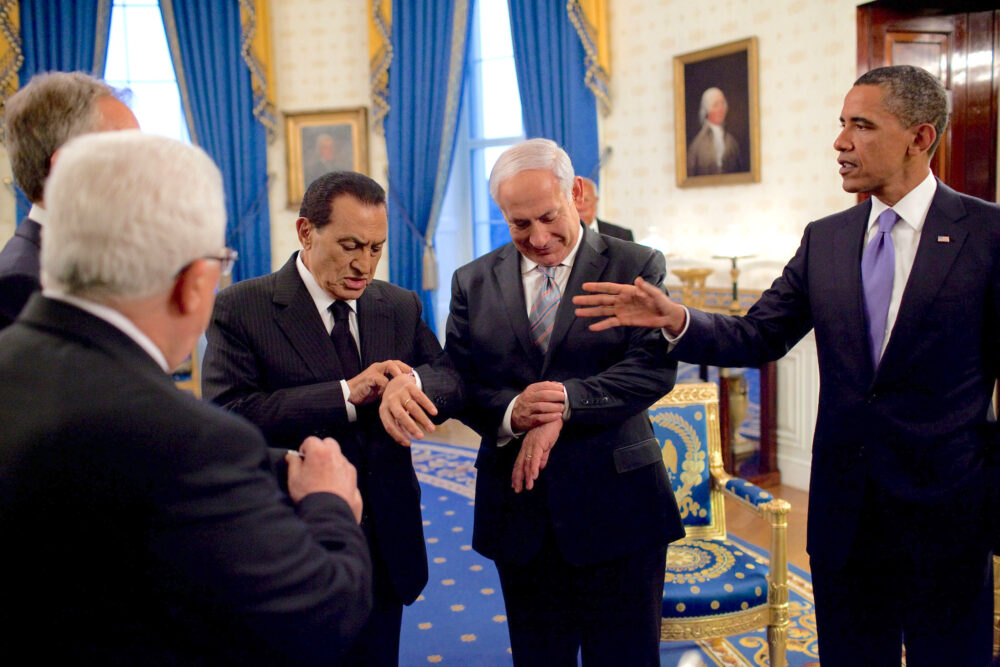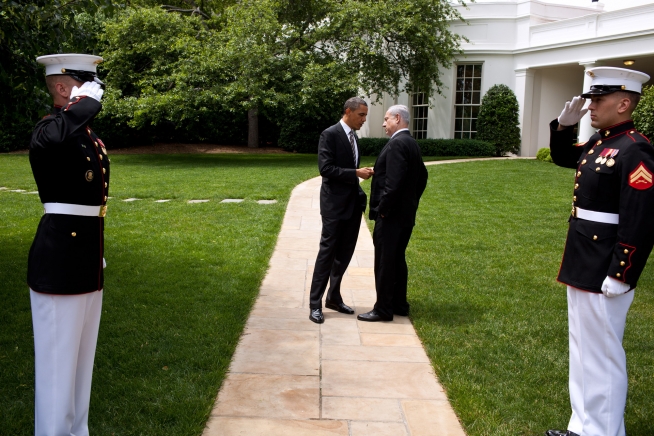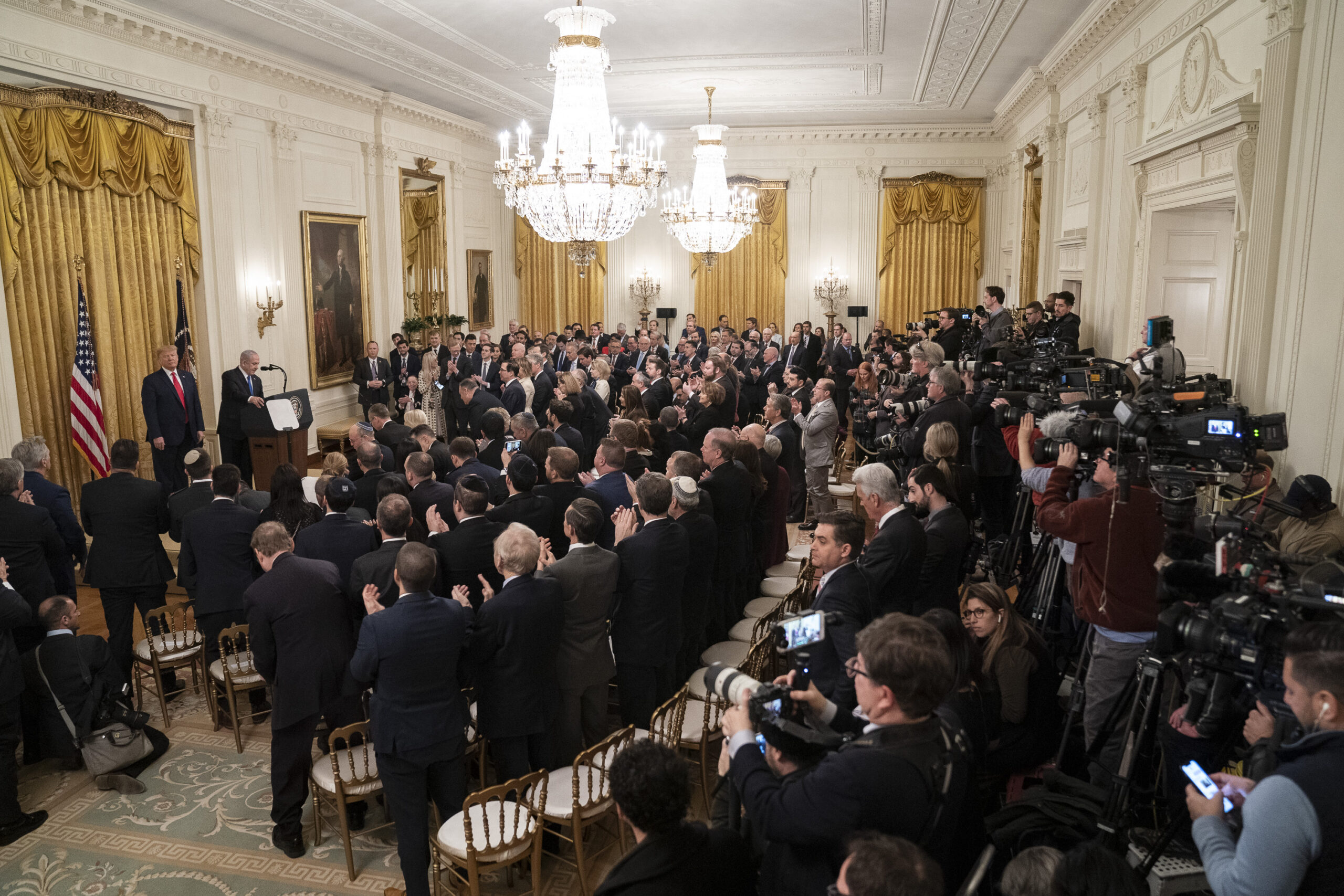What the Israeli prime minister really thinks about Arabs and how he treated Barack Obama is revealed in his recent book, reviewed here by As’ad AbuKhalil.

Sept. 1, 2010: From left: Palestine Authority President Mahmoud Abbas, Egyptian President Hosni Mubarak and Israeli Prime Minister Benjamin Netanyahu check their watches to see if it is officially sunset before the start of a working dinner with U.S. President Barack Obama, on right. (White House/ Pete Souza)
By As`ad AbuKhalil
Special to Consortium News
This is the third and final part of As’ad AbuKhalil’s review of Bibi: My Story. You can here read part one and part two.
 The support that Israel provides to Arab despots is vividly displayed in Netanyahu’s recent book Bibi: My Story. He is not bashful about admitting that he intervenes directly with Washington to urge more support for Arab despots when they are weak or when they are facing an uprising.
The support that Israel provides to Arab despots is vividly displayed in Netanyahu’s recent book Bibi: My Story. He is not bashful about admitting that he intervenes directly with Washington to urge more support for Arab despots when they are weak or when they are facing an uprising.
Israel, like the U.S., has invested in the Arab despotic order. Without this order, there would not have been a single peace treaty with Israel.
Netanyahu urged former U.S. President Barack Obama to stand by Egyptian leader Hosni Mubarak and used the scare tactic of an impending Islamist threat. Obama stood solidly behind Mubarak until it was no longer possible to support him in the face of fierce and massive of Egyptian popular rejection of his rule.
But Netanyahu assures readers that Mubarak is not the monster that he was portrayed by the Egyptian people. Netanyahu found him likable. Why would the Arab people dare to overthrow a ruler who is liked by Netanyahu? Don’t they know better? Sadly for Israel, the people of Egypt also revolted against Anwar Sadat and he was assassinated right after he signed the peace treaty with Israel.
At one point in 2011, Netanyahu tells us, Joe Biden admonished him after he publicly rebuked Obama inside the White House. The then-vice president told him: “No one, but no one, has the right to humiliate the president of the United States.” (p. 408)
Of course, a president of the U.S. who allows an Israeli leader to humiliate him in the Oval Office before the press deserves to be humiliated. It should not be left to the vice-president to defend the office of president of the United States.
 Like all Israeli accounts about Arabs, there is a reference to an Arab fan of Israel. This is not new. Even in the 1902 book Altneuland (a work of fiction by Theodore Herzl, the founder of political Zionism) there is a reference to a fictitious Arab (named Rashid Bey) who just loves and appreciates Israel. In the same genre, Netanyahu cites a Syrian (unidentified of course) who tells him that Israelis are “the only angels in this hell.”
Like all Israeli accounts about Arabs, there is a reference to an Arab fan of Israel. This is not new. Even in the 1902 book Altneuland (a work of fiction by Theodore Herzl, the founder of political Zionism) there is a reference to a fictitious Arab (named Rashid Bey) who just loves and appreciates Israel. In the same genre, Netanyahu cites a Syrian (unidentified of course) who tells him that Israelis are “the only angels in this hell.”
No wonder that, after 70 years, Israelis haven’t a clue about Arab public mood and opinion. Deeply held racist dogmas about Arabs persist in Israel. They want to believe that there are Arabs who find Israeli occupation and aggression pleasurable and enjoyable.
‘Wiping off the Map’
Netanyahu admits that in 2011 Obama decided to “ease the pressure on” him in order to secure reelection. Obama gave an address at the United Nations that Netanyahu describes as “the most pro-Israel speech he would give” (p. 419). Obama in that speech spoke about how Arabs want to “wipe [Israel] off the map.” Who is calling for wiping Israeli off the map when there is not a single Middle East country with the power to wipe off any nation?
Of course, Israel with its nuclear weapons, is the only country with the capability to wipe out other countries. Furthermore, in talking about “threats” to wipe out Israel, no American leader has ever considered that the Palestinian nation was actually wiped out by Zionist forces in 1948. History of the holy land begins in 1948, as far as U.S. leaders are concerned.
Netanyahu’s book reminds us too that the Muslim Brotherhood in power (whether in Egypt, Tunisia or Libya) has proven to be much more “pragmatic” in dealing with Israel. Despite decades of fiery rhetoric about jihad against Israel and promises to salvage the Palestinians, the Muslim Brotherhood (including the opposition in Syria) have reached accommodation with Israel in order to secure American acceptance of its rule.

Rached Ghannouchi in 2017. (Mouad888, CC BY-SA 4.0, Wikimedia Commons)
Rashid Ghanoushi (leader of Nahda in Tunisia, which is the local version of the Brotherhood) visited Washington and spoke at the Washington Institute before he assumed power in Tunisia. Presumably, he agreed to abandon a previous call to insert an article in the Tunisian constitution criminalizing normalization with Israel. (Ghanoushi was just arrested as part of a crackdown of opposition figures in Tunisia.)
Netanyahu maintains that Mohamed Morsi (the second popularly elected president of Egypt — Gamal Nasser was genuinely freely elected by the Egyptian people) was eager to mediate between Israelis and Palestinians in order to obtain “American goodwill” (p. 434).
But when Morsi sent tanks and armed personnel carriers to Sinai (“without our permission,” says Netanyahu) Netanyahu sent him a “stern message”: that if he does not remove the military force he will appeal to the U.S. Congress to “stop the annual $2 billion in U.S. aid to Egypt.” (p. 434)
It is stunning that a foreign leader can threaten the elected leader of another country with a cut-off of U.S. aid. It speaks volumes about Israeli clout in Washington, D.C. If an Arab were to write of such a scenario, he or she would be accused of anti-Semitism.
‘Hard Power Better’

President Obama speaks with Israeli Prime Minister Benjamin Netanyahu outside the White House on May 20, 2011. (White House/Pete Souza)
When Obama decided against going to war against Syria, Netanyahu was furious with him. How dare the president of the U.S. not launch a war favored by Israel? Didn’t the Iraq war prove to be a great achievement for both countries? Obama meekly told Netanyahu that he wanted a different style of leadership in the world. Netanyahu told him: “Soft power is good but hard power is even better.” (p. 440)
Shockingly, Netanyahu was talking about U.S. power; he has no qualms about discussing with the U.S. president how U.S. power should be used around the world. Netanyahu then mocked Obama as someone who viewed himself as a “citizen of the world.” (p 440).
In writing about African immigrants to Israel, Netanyahu is blatantly racist. He says that in 2013, “Israel was beset by a growing stream of illegal migrants from Africa. These were primarily able-bodied young men leaving Eritrea, Sudan, and other countries in search of better income.” Netanyahu maintains that some of those immigrants were not “hard working and law abiding.” He adds: “Crime and violence abounded in the neighborhoods they entered.” (p. 448)
If an American politician were to write about blacks in such a manner in 2023, he or she would have been compelled to resign or to at least offer a sincere public apology.
Moreover, it is rather odd for the prime minister of Israel to be complaining about illegal immigration when the country consisted (at its illegal birth) of mostly illegal immigrants. And as far as crime and lawlessness in the neighborhood, the entire Middle East was far more peaceful before Israel was introduced into the region by force.
Casually, Netanyahu discusses his exchange about politics and censorship with Mark Zuckerberg, the head of Meta, the parent company of Facebook. Those of us Arabs who have been temporarily or permanently banned from social media have Netanyahu to blame. It is clear that the Israeli government submits to the heads of social media giants its definition of offensive language in order to suppress views and opinions that are damaging to Israeli propaganda interests.
Netanyahu Initiated Abraham Accords

President Donald Trump listens as Israeli Prime Minister Benjamin Netanyahu delivers remarks on Jan. 28, 2020, during the unveiling of the Trump administration’s Middle East Peace Plan. (White House, Shealah Craighead)
As far as the Abraham Accords are concerned, it is clear from the book that the initiative did not start with the former President Donald Trump or with Trump’s son in law, Jared Kushner, but originated with Netanyahu himself. Of course, an American cover helps in its promotion.
Netanyahu was clearly very impressed with the despots of the UAE and Saudi Arabia and suggested that Trump invite them all to make peace with Israel. Then Netanyahu met with Trump and brought his usual props with him: he showed him an Israel-produced illustration showing 130,000 Hizbullah missiles aimed at Israel.
It is doubtful he showed him a map of all the Israeli missiles aimed at Lebanon. Trump was so impressed that he wondered how Netanyahu was able to sleep at night.
This is the nature of substantive high-level talks between the U.S. and Israel.
Netanyahu claims that Arab “governments” did not care whether the U.S. embassy relocates to occupied Jerusalem. It is convenient for Israel in its peace treaties with Arab despots to speak about “governments” and not “people” especially after the Egyptian people made their feelings very clear about Israel once Mubarak was overthrown.
Yet, Netanyahu is honest in admitting that the only reason the Sudanese military junta agreed to establish relations with Israel was in order to be removed from the highly negotiable U.S. list of terror-supporting states. (p. 554)
According to Netanyahu, all Arab despots who make peace with Israel receive praise. Those who don’t are bloodthirsty Nazis. This is not unique to Netanyahu but applies to every Israeli leader over the years.
Sadat, who had blatant Nazi sympathies and had expressed anti-Jewish sentiments in the past, has been hailed by Netanyahu as a statesman. The rulers of the UAE and Saudi Arabia are praised by him as “smart and savvy.”
This is what Netanyahu really thinks, in his own words.
As`ad AbuKhalil is a Lebanese-American professor of political science at California State University, Stanislaus. He is the author of the Historical Dictionary of Lebanon (1998), Bin Laden, Islam and America’s New War on Terrorism (2002), The Battle for Saudi Arabia (2004) and ran the popular The Angry Arab blog. He tweets as @asadabukhalil
The views expressed are solely those of the author and may or may not reflect those of Consortium News.

Well the headline photo really says it all. “Boomer the BiBi” smiling checking his watch like the condescending, arrogant prick he really is.
Thanks CN
When dealing with Netanyahu it is important to remember this “Instruction” from the Jews religious text’ quote| “By deception thou shall succeed”. Netanyahu has demonstrated many times over, that he believes this and uses it at every opportunity. If his mouth is moving, you need to take shelter or take out insurance.
Netanyahu has the same low regard for Americans and Christians that he has for Arabs and Muslims. His minions in the US are diligently working to make criticism of Israel’s actions illegal. This is a direct attack on the US Constitution’s 1st Amendment.
His ultimate goal here is to get the same level of control over the internet as he has over the corporate media, which maintains a complete blackout on Israel’s history, current actions, and influence over America. JFK tried to force the AIPAC of his day to register as an agent of a foreign government, thereby getting its money out of American politics. That goal should be revived.
I don’t need to read Bubba’s book to understand who and what he is.
In fact if Israel ever splits completely with the US a whole bunch of Americans will get a very rude awakening.
The man is a murderous common criminal.
Wake up America, the trouble with Israel is not the average Jew, but the same as Americas biggest problem, crooks criminals and murders for leaders.
Thanks CN
Tens of millions of grass-roots Americans supports Israel 1) because of our own cowboys and indians history and 2) because tens of millions of Christian Zionists think they need a Jewish state to fulfill the future history of Dispensationalism and bring Jesus back soon.
I know it sounds absurd to secularists, but absurd ideas can still have great political power.